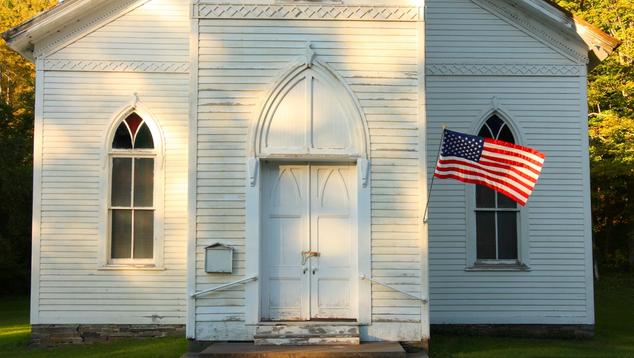Gallup’s 24-year history of asking each February about Middle East sympathies has consistently shown a much higher level of sympathy for the Israelis than for the Palestinians.
But as my colleague Jeff Jones summarized in his analysis of recent data, “While Americans have always sympathized more with the Israelis, the gap has narrowed in recent years,” reflecting a drop in the percentage of Americans saying they are sympathetic to the Israelis and an increase in sympathy for the Palestinians. Specifically, the attitudinal gap between sympathies for the Israelis and sympathies for the Palestinians has dropped from 42 percentage points in aggregated surveys conducted between 2001-2019 to 30 points over the past five years.
A number of complex factors are behind these changes in sympathies. One of the most interesting relates to shifts in Americans’ religious identities and overall religiosity. These changes, it is reasonable to conclude, have affected public opinion on the Middle Eastern situation. It is these relationships that I’ll explore in this column.
It’s worth noting that this “sympathies” question involves a forced choice, and thus represents a relative measure of sympathy when Americans are asked to choose between the Israelis and the Palestinians. Other questions asking Americans about their image of the Israelis and the Palestinians one by one show a recent downturn in the images of both.
Religion Is Tied to Attitudes Toward the Middle East
As I’ve reviewed previously, the relationship between Americans’ religious identity and support for Israel or for the Palestinians in the Middle East has been evident as far back as we have data. U.S. Protestants are among the most sympathetic to Israel (along with the much smaller groups of Jews and Mormons), while those with no religious identity (and those who identify with other non-Christian religions) are the least. Catholics are generally close to Protestants in their Middle East sympathies.
The demographic realities undergirding these relationships have been changing. Most importantly, although Protestants have retained their high level of sympathy for Israel, the number of Protestants in the U.S. has been shrinking. This trend lessens the impact of one of Israel’s core bases of support in the U.S.
And as the number of Protestants has been decreasing, the number with no religious identity in the U.S. (“nones”) has been growing. These nones have at the same time become even less supportive of Israel than before. Finally, American Jews themselves are somewhat less sympathetic to Israel than previously. Although the number of Jews in the U.S. is relatively small, this trend too does not augur well for Israel’s positioning in this country.
Protestants Shrinking, “Nones” Increasing
When we look at religious groups in the U.S., two questions are of interest. First, what are the changes in the relative proportions of these groups as a percentage of the population? Second, have the views on the Middle East within each group changed over time?
Protestants (basically those who identify as non-Catholic Christians in Gallup surveys) continue to be the largest religious group in the U.S., but the representation of this group has been shrinking, going from 52% of the population in 2000-2019 to about 45% in the past few years. Those with no religious identity -- “nones” -- have at the same time risen from as low as 8% of the population in 2000-2005 to above 20% today. The representation of other religious groups over time has remained roughly constant.
Protestants have generally been a bulwark of support for Israel in the U.S. -- a relationship built on the historical centrality of Israel in the Judeo-Christian religious tradition from which Protestantism derives. And, constituting some relatively positive news for supporters of Israel, there hasn’t been a lot of change in sympathies toward the Israelis and Palestinians over the past five years among Protestants, compared with the previous two decades. Sympathy for the Israelis has stayed high, with a modest uptick in sympathy for the Palestinians.
The problem for Israel, of course, is that the percentage of these “Israeli-sympathetic” Protestants in the U.S. population has been declining.
On the other hand, not only has the percentage of the U.S. population with no religious identity been increasing (popularized by some researchers as “the rise of the nones”), but nones have become increasingly likely to say their sympathies lie with the Palestinians rather than with the Israelis. In the past five years, in fact, “nones” have tipped to the point where they evince higher sympathy for the former than the latter -- the only major religious group with plurality sympathy for the Palestinians.
This is a double whammy for Israeli support -- an increase in size among a group that is increasingly likely to be sympathetic to the Palestinians.
Catholics and Jews Become Modestly More Sympathetic to Palestinians
The percentage of Catholics in the U.S. population has remained about the same over time, but Catholics have shown a somewhat more significant increase in sympathy for the Palestinians in the past five years than is the case for Protestants.
In short, Israel is losing net sympathy among Catholics, although Catholics continue to be more than twice as likely to say they are sympathetic to Israelis than to the Palestinians.
Jews represent a small percentage of the U.S. population overall (about 2%), so changes in their attitudes in any direction won’t have a major effect on the national average. But the historical connection with and support for Israel among American Jews make changes in their attitudes of significant interest.
The sample sizes for Jewish respondents in our Gallup polls are relatively small (a total of 118 respondents in the 2020-2024 aggregate), but it is clear that the monolithic sympathy for Israelis among American Jews in the previous two decades has shifted significantly. Jews have shown a downturn in sympathy for the Israelis and an uptick in support for the Palestinians over the past five years. Plus, Jewish respondents have become somewhat more likely to say they are not sympathetic toward either group, instead saying they have sympathy for both, for neither, or not giving an answer (increasing from 6% to 13% between the two observed periods).
Implications of Americans’ Declining Religiousness
We can also analyze trends in sympathies in the Middle East based on religious service attendance. Those who attend church most often are the most sympathetic to Israel, while those who attend least are the most sympathetic to the Palestinians. But over the past two-plus decades, Americans have become less likely to attend religious services. Thus, everything else being equal, we would expect to see support for Israel declining, as has been the case in the past five years. This fits in with my analysis of trends among religious identity groups above -- given that Protestants are among the most religious groups in the U.S., and nones -- by definition -- are the least.
The relationship between greater religiosity and support for Israel among highly religious Americans (who are overwhelmingly Protestant or Catholic) is partly explained by that country’s importance in the Bible’s Old and New Testaments. Those who are very religious are apparently inoculated against the more general tide of public opinion moving toward the Palestinians.
As was evident from the previous analysis of nones, the problem for Israel is the shrinking number of highly religious Americans, diminishing the potential impact of this traditional bulwark of support for Israel.
Adding a further negative for Israeli support, the segment of the population who never attends services has become even less likely to be sympathetic toward the Israelis over time and more likely to be sympathetic to the Palestinians. The change among this group has been so substantial that over the past two-plus decades, sympathies have moved from nearly 2 to 1 in favor of the Israelis to roughly tied.
Thus, highly religious Americans -- Israel’s most reliable supporters -- have decreased as a percentage of the population, while those who are least likely to be sympathetic have increased in size and have become more sympathetic to the Palestinians than was the case previously.
Young People
A good deal of attention relating to American public opinion on the Middle East has centered on the protests on college campuses around the country. This is not unexpected. Sympathy for the Palestinians has traditionally been higher among younger than among older Americans, even though across the 2000s and 2010s, young people on average remained more sympathetic toward the Israelis than toward the Palestinians, with not a lot of change over this period.
But the past five years have seen 18- to 29-year-olds’ sympathies shift to the point where they are roughly evenly divided between the two Middle East antagonists. This makes them by far the most pro-Palestinian of any age group. (There has been little significant change in the proportion of the U.S. population who are 18-29 over time.)
Summary
Americans’ attitudes toward the Middle East situation are associated with partisan and ideological characteristics, as well as demographic variables such as age, gender, geographic location and race.
But views on the Middle East carry with them a unique dimension arising from Israel’s historical connection to the mainstream Judeo-Christian religious tradition in the United States. Even with the dwindling importance of religion in the U.S. overall, more than two-thirds of the country continues to identify with some variation of the Judeo-Christian tradition in which the historical Israel plays a major part. I think it’s a reasonable hypothesis that the historically strong support for Israel among the American public is based in large part on this shared religious connection.
But trends in religious identity and religiosity in the U.S. don’t bode particularly well for Israel’s future positioning in Americans’ minds. Protestants, the group with the most sympathy for Israel (along with Catholics and the small population segments of Jews and Mormons), are dwindling in number, while those with no religious identity -- and thus the highest probability to support the Palestinians -- are growing. Further, those who are frequent religious service attenders remain largely sympathetic to Israel, but their numbers are also shrinking. Sympathy for the Palestinians is rising fastest among the rapidly growing group of those who never attend religious services and those with no religious identity. Sympathy for the Palestinians is also growing among Catholics, who constitute more than a fifth of the U.S. population.
In short, shifts in the U.S. religious landscape are weakening the level of traditionally strong attitudinal support Israel has received from Americans.
It has been said about the Middle East -- in reference to the differing birth rates among Jews and Palestinians -- that demographics are destiny. In terms of public opinion about Israel within the U.S. -- the largest financial and military supporter of Israel in the world -- it can be said that religion is destiny, at least to some degree. Current trends suggest that this destiny has more risks for Israel than benefits.
To stay up to date with the latest Gallup News insights and updates, follow us on X @Gallup.




